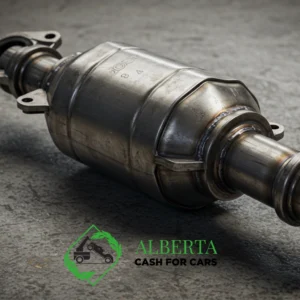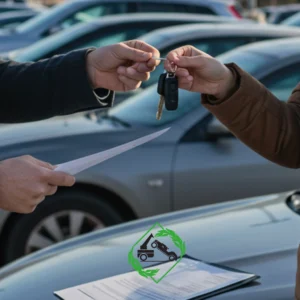Honesty and transparency should be the guiding principles in the realm of junk auto dealings. The junkyard industry, however, is not immune to dishonest activities, just like any other sector of the economy. As a knowledgeable seller, it’s crucial to be aware of common junkyard scams that can result in you receiving less money for your car than you should. Here at Cash for Cars Calgary, we provide a thorough review of the most prevalent junkyard rip-offs and deals you should avoid.
No Hassle, Just Cash — Book Your Free Pickup or Quote Today!
Common Junkyard Scams Prevention
This guide will teach you to be cautious about certain things to prevent common junkyard scams.

Getting Oriented at the Junkyard
The first step to prevent junk car scams when entering a junkyard is getting properly oriented to the layout and inventory. Reputable yards will have an office, sign-in procedures, and a structured inventory system. Take note of any organization methods used to categorize parts and vehicles. A disheveled atmosphere or lack of structure can be a red flag for shifty business practices.
Before handling any parts, review the junkyard’s procedures and fees. Many will require signatures on waiver forms to allow you to pull parts yourself. Tools, equipment, or staff assistance may be available for a fee. Understanding the junkyard’s processes will help avoid misunderstandings or unexpected charges.

Inspecting Parts Thoroughly
Once you identified the needed parts, meticulously inspect each before removing them from the vehicle. Check that the part numbers match what you require. Look for damage like cracks or missing bolt holes that could impact function. Confirm electrical parts power on and work properly.
Starting the junkyard car to test electronic components is ideal. This lets you observe warning lights and gauge activity and system performance before purchasing the part. Test headlights, turn signals, wipers, seat motors, and window switches to verify functionality.
Move the steering wheel to check for looseness or binding issues if allowed. Shift through all gears while running to check the transmission. Getting hands-on with parts before buying gives you the best sense of their true condition.

Limit Personal Information Provided
Even legit buyers need only basics like VIN # and basic vehicle details for initial quotes. Never supply driver’s licenses, social security card copies or financial account information at any point in transactions. Beware unsolicited calls as well.
Review All Documents Closely Before Signing
Scrutinize the details on formal quote estimates, contracts and especially title transfer paperwork prior to inking signatures during ownership exchange meeting. Spotting concerning specifics early prevents Manipulation opportunities.
Watching Out for the Switcheroo
One of the oldest and most common junkyard scams is the infamous “switcheroo.” This is when you’ve identified a specific part to purchase, but the seller swaps it out for a faulty or incorrect part without your knowledge. They may distract you momentarily or wait until your back is turned before switching.
To prevent this, use spray paint to mark the parts you intend to buy while they are still on the vehicle. Keep chosen items in your sight at all times, if possible. If leaving to retrieve tools or load your vehicle, set the parts aside in a safe location rather than leaving them accessible.
You can also photograph parts before removal to document their exact state while still in the car. Take close-ups of part numbers, cracks, or damaged spots to compare to the removed part later. If the markings don’t match your pictures, it’s likely a switcheroo occurred.
Spotting Price Manipulation
Another way of common junkyard scams from customers is by arbitrarily inflating prices at the time of payment after agreeing to lower quotes initially. They may provide reasonable estimates upfront to “hook” you into pulling parts before jacking up prices unexpectedly at checkout.

To prevent price manipulation, request written quotes on a parts request form before taking anything off a vehicle. Most reputable yards will provide this documentation upfront. If a seller hesitates or refuses, consider taking your business elsewhere.
Having written part quotes makes it much harder for junkyards to hike prices later. You also have documentation to show if they change the agreed-upon amounts. Print the quotes to retain a hard copy as your proof of pricing.
Sniffing Out Potentially Stolen Parts
There is always a risk when buying used parts, and you may unknowingly purchase stolen goods. Mitigate this by checking parts for identifying numbers or markings that look removed or tampered with. Use part number lookups to see if they’re associated with stolen items.
Ask the junkyard for documentation on where and when parts were acquired. Reputable sellers will have invoices, manifests, or other paperwork trailing their inventory. Be extra cautious with commonly stolen items like catalytic converters, which may end up in junkyards. It’s better to pass on questionable parts than risk legal issues down the road.

Avoiding Odometer Rollbacks
Odometer fraud is widespread on many junkyard vehicles as sellers roll back mileage to increase profit potential. Always verify odometer readings against vehicle history reports from sources. Look for signs of physical tampering around the gauge and mileage inconsistencies on the title or registration.
Test drive junkyard vehicles yourself before purchase, if possible, to get a feel for actual mileage. Low readings on 20-year-old cars or gauges with signs of tampering are giveaways of potential fraud. Trust your instincts – if a vehicle’s age and wear don’t match the miles, proceed cautiously. Get a mechanic’s inspection to help confirm actual mileage to prevent junk car scams.
Scams Involving Upfront Payments
One widespread scam approach involves supposed scrap car buyers reaching out with unsolicited calls or direct mailers offering above average quotes if owners pay a small upfront “processing” or “inspection” fee initially. Vulnerable sellers release payment information or checks, but tow trucks never actually arrive.
Requests for Upfront Payment
Shady operators often insist on upfront “transport” fees before dispatching tow trucks to collect vehicles. Once payments clear however, communication ceases without follow through. Reputable buyers never demand advance fees to take cars away.
Cashier Check Scams
In cash for junk cars scams field, similar scams mail fake cashier checks claiming to cover future towing costs and urge depositing funds quickly. Banks initially clear counterfeit checks, but when fraud gets detected weeks later, owners must repay debts while cars get stolen through powers of attorney signed over already.
Scams Through Third-Party Affiliate Networks
In similar category, many online lead generation networks claim to connect owners with national salvage company bids for cash for junk cars scams. However, most fail delivering services after capturing personal information and selling data instead to untraceable junk car affiliates with questionable reputations and practices.
Broken Promises from Affiliates
Fill out forms on affiliate marketplaces to get quotes from major junk car yards. After submitting all vehicle details plus personal contact info, the actual towing service and revenue never materializes leaving sellers still stuck with inoperable vehicles.
Title Washing Scams
When selling your junk car to a yard, be wary of title-washing scams. This is when buyers falsify documentation to hide a vehicle’s salvage history and increase resale value. Insist on reviewing title records yourself and cross-check VINs on all paperwork.

Do not sign over a title or accept payment until you’ve thoroughly validated documentation. Carfax or auto-check vehicle history reports can help uncover title discrepancies. Never trust a buyer who insists you skip title checks or rushes the sale.
Keeping Your Guard Up: Spotting Junkyard Shenanigans
Look, we all want to get a good deal, especially when we’re dealing with used car parts or trying to get rid of an old clunker. But sometimes, people… well, they’re not always playing fair. So, how do you keep yourself from getting taken for a ride?
If It Feels Off, It Probably Is
Seriously, if something just doesn’t sit right with you, walk away. Maybe the price seems way too good to be true, or the person you’re dealing with is pushing you to rush the deal. That’s a huge red flag. Don’t be afraid to say “no thanks” and find somewhere else.
Do Your Homework
Before you even set foot in a junkyard, do some digging. Check out online reviews, ask around, see what other people’s experiences have been. And when it comes to pricing, get a rough idea of what your car or the parts you need are actually worth. That way, you won’t get lowballed.
Get Everything in Writing
This is super important. Get quotes, agreements, everything written down. And read it carefully! Don’t just skim it. Make sure it matches what you discussed. If they won’t put it in writing, that’s another sign to bail.
Don’t Give Out Too Much Info
They don’t need your life story, your social security number, or your bank details. Stick to the basics: car info, VIN, that kind of stuff. And never, ever give out payment info upfront, especially if they contacted you first.
Watch Out for the “Switcheroo”
This one’s classic. You find the perfect part, but when you go to pay, it’s been swapped with a dud. Mark your parts, take pictures, and keep an eye on them. If you leave to get tools, put the parts somewhere safe, not just out in the open.
Be Smart About Payments
Cash is great, but it’s hard to trace. Cashier’s checks are better, but even those can be faked. If possible, stick to bank transfers or other traceable methods. And count your cash before you sign anything.
Stay Safe: Your Well-Being Comes First
Never meet a buyer at your house. Meet in a public place or at their business. And if you’re pulling parts yourself, wear proper gear: gloves, safety glasses, the works. Trust me, you don’t want to mess around with rusty metal and who-knows-what fluids.
Remember the Title: Don’t Get Caught Out
Don’t sign over the title or accept payment until you’re absolutely sure everything is legit. Check the VIN, make sure the title matches, and don’t let anyone rush you.
At the end of the day, most junkyard folks are decent people just trying to make a living. But like anywhere, there are a few bad apples. By staying alert and following these tips, you can avoid the scams and get what you need without getting burned.
Lowball Offers on Junk Cars
Junk and salvage yards often specialize in buying old, damaged cars to part out or scrap. However, some may offer insultingly low quotes for your vehicle while exaggerating repair needs. Come armed with your own fair price research beforehand by checking guides like Kelley Blue Book.
Get written repair estimates from mechanics to refute any exaggerated claims of broken parts and overstated repair costs. Pointing out desirable parts like new tires or batteries can help negotiate a higher price. Consider selling to the general public rather than exclusively to junkyards to increase value.
Selling Safely for Maximum Value
When selling your car directly to a junkyard or salvage yard, take precautions to maximize profit and security. Never allow prospective buyers access to your home address. Instead, meet only on neutral grounds, like their business location. This prevents potential scammers from knowing where you live.

Agree upon a final quoted price in writing after they inspect your car. Accept only secure payments like certified cashier’s checks (never personal checks or wire transfers). Count Cash carefully before signing over the title. Make sure the buyer signs their portion immediately to help prevent fraudulent resale.
Stay present until your old car is loaded onto their tow truck. Once home, promptly notify your DMV of the sale and cancel registrations to avoid liability issues. Removing license plates yourself provides further proof the vehicle is no longer yours.
Motivations for DIY Auto Repair
To avoid common scams you can rely on DIY auto repair. Top motivations pushing vehicle owners towards home garages over traditional workshops include massive savings avoiding high hourly labor charges plus taxes for similar jobs performed by professional mechanics. Repair needs popping suddenly between pay cycles also force financially constrained situations better managed hands-on.
Additionally, DIY habits allow introducing personal custom mods like audio-visual electronics, aesthetic accessories or performance upgrades matching individual preferences beyond what independent garages readily accommodate. Masters often prioritize quick turnaround times rather than allow creative tinkering freedom.
Some develop DIY servicing skills purely as passionate hobby without commercial intentions while several leverage competencies for part-time garage businesses later providing affordable options within local communities.
Gathering Necessary Knowledge
DIY auto repair success relies heavily on accessing maintenance manuals or video tutorials accurately mapping procedures for respective vehicle make-models highlighting intricate custom nuances. Online owner forums becoming popular recently reveal practical tips supplementing any information gaps.
Bookmark multiple references across text, images and multimedia during planning phase rather than frantically searching mid-way sticking hands inside an partially dismantled engine in frustrated guesswork or hoping things miraculously fall into place! Shortcuts mostly fail given precision required.
Post DIY auto Repair Testing
Following reassembly after component swaps or overhauls, preliminary testing remains essential before roadworthiness certifications. This could involve brief test drives checking fault resolutions, using handheld scanners to confirm clearing past error codes and redo bolting passes to prevent loosened fasteners through vibrations later. Sensor adaptations via tuning software might be necessary for overall integration. Confirm all tools collected back into toolboxes preventing accidents later from stray forgotten objects near rotating machinery.
Cash for Junk Cars Scams
While legitimate services provide a valuable solution for individuals looking to part ways with their old cars, a subset of opportunistic actors engages in scams that exploit unsuspecting sellers. Understanding the prevalence and dynamics of these scams is crucial for safeguarding one’s interests in this industry.
Fake Towing Services
Among the various scams perpetrated in the cash for junk cars scams industry, the use of fake towing services stands out for its cunning execution. Scammers adeptly manipulate sellers’ urgent need for vehicle removal by posing as legitimate towing companies. The sequence typically unfolds as follows: a seller, seeking to dispose of their old vehicle, contacts a service advertising swift towing and cash transactions. The scammer, posing as a towing professional, arrives promptly, promising hassle-free removal of the vehicle.
Once the vehicle is loaded onto the tow truck and taken away, the seller realizes they have fallen victim to a scam. Contacting the supposed towing service yields no results, and the cash promised for the vehicle never materializes. This type of scam not only results in financial loss but also leaves the seller without their vehicle and at the mercy of unscrupulous actors.
Online Payment Scams
With the increasing prevalence of online transactions, scammers have adapted their tactics to exploit sellers through online payment scams. Sellers, enticed by the convenience of virtual transactions, may agree to receive payment through online platforms. However, scammers take advantage of the trust placed in online payment systems, manipulating sellers into releasing their vehicles without receiving the promised funds.
Cash for junk cars scams typically involves the scammer presenting a fabricated proof of payment or a fraudulent confirmation of funds. Unsuspecting sellers, relying on the apparent legitimacy of these documents, hand over their vehicles, only to realize later that they have been duped. The absence of physical cash or a traceable transaction leaves sellers in a vulnerable position, with little recourse for recovering their losses.
Impersonation of Reputable Services
Impersonating legitimate cash for junk cars services is a tactic that exploits the trust sellers place in established and reputable entities. Scammers create a façade by adopting names, logos, and communication styles similar to those of well-known services. This impersonation not only deceives sellers but also tarnishes the reputation of legitimate businesses within the industry.
The impersonation tactic adds a layer of complexity to the scam, making it challenging for sellers to distinguish between legitimate and fraudulent services. The trust built over years by reputable services becomes a vulnerability that scammers exploit to their advantage. As a result, sellers may unknowingly engage with fraudulent entities, believing they are dealing with trustworthy and established services.
Conclusion
As you navigate the world of junk car sales, being informed is your best defense against potential scams. By understanding these common junkyard scams and adopting cautious practices, you can ensure a smooth and fair transaction. Remember to obtain written documentation of quotes and agreements, research local regulations, and never hesitate to walk away from a deal that seems too good to be true.







